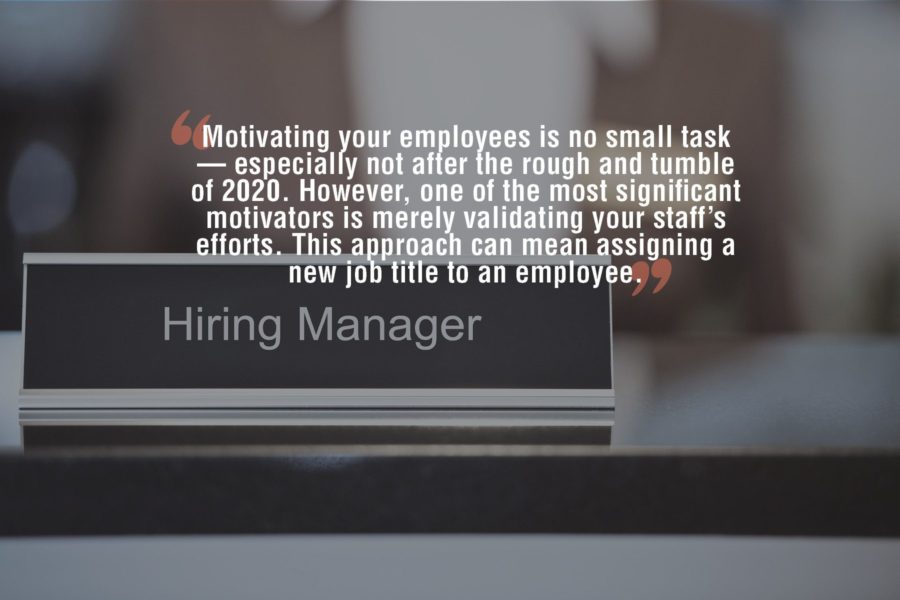As a business or HR leader, you’ve likely considered the influence of your professional title more than a few times during your career. Perhaps you wondered how your title impacts your pay, credibility or how others perceive you.
Remember that your workforce also runs similar thoughts through their minds. So, the question is, do job titles matter? In a word, yes. However, let’s examine this concept from a few angles to know how influential job titles truly are.
Understand the Impact of a Job Title
Many people only regard job titles as the bit of information you insert in a resume. However, there’s more to it than that. These few words describing your professional position could make an impression on everyone you meet. Here are a few examples:
Hiring Managers
If you operate your business like most, you tend to promote from within. Lateral moves or even career changes at one company aren’t anything unusual. Not only does this strategy reduce hiring costs, but it also facilitates a smoother transition and minimizes production impacts.
Consider your current team members and all the departments or job titles they’ve experienced. From an associate to a supervisor to a manager to a director is a natural progression, for example.
Most likely, your team is made of people with variations of this sequence or pattern under their belt. It only makes sense for your entire company to reflect uniform job title sequences, no matter the department. Promoting from within works best when the transition in the company is fluid, making job title consideration a critical part of a hiring manager’s role.
Other Employees
A job title is often a way for coworkers to gauge how “high” someone is on the corporate ladder. Some people will connect with any team member, but others tend to be particular, talking solely with those in leadership positions. So naturally, job titles are relevant to a company’s hierarchy.
More importantly, job titles matter to other employees because it helps your team establish boundaries with one another. It tells others who is responsible for what. Clearly defined roles typically mean more productivity and profit for your company overall.
Clients
Your clients don’t always need you to define boundaries like team members, but they typically want to know the extent of any single representative’s authority. So, if you’re wondering if job titles matter to clients, the answer is yes.
Clients are more willing to collaborate with those in authority. For example, consider an Account Manager vs. a Key Account Manager. The second job title offers a client more conviction that they’re meaningful to your company. Clients often decipher your business story from job titles, too. So, use your titles to tell the story you want to tell.
Using Job Titles to Attract and Retain Talent
Companies are hunting for top talent; however, top talent is also searching for quality employers. That said, all-star applicants know what to look for in a job title. So, your HR strategy should include crafting succinct job titles. Here are a few more angles to consider.
- Clarity: Make sure to write your job titles with clear and direct expectations. The Supervisor of Smile Makers is far less descriptive than the Administrative Assistant, so be straightforward. Think about your company’s natural job sequence, as well. Titling a position as “supervisor” when it’s honestly an “assistant” role only sets up that individual for future challenges.
- Momentum: Furthermore, adhering to the natural job title sequence encourages loyalty from your talented employees. Look at the situation from your workforce’s perspective. It’s comforting knowing that you will start as an assistant and have the opportunity to move up to director one day, assuming you meet all the proper professional milestones. So, HR departments must feed off that momentum by creating suitable job titles to keep top talent around.
- Sophistication: Think about the job ads you’ve read containing words like “ninja” or “Jedi.” Perhaps these job ads also had several titles, furthering any confusion about the position. You might have wondered if the ad was describing one job or two or more! So, avoid writing job titles with buzzwords or clickbait. Otherwise, most talented individuals won’t take your company or the job seriously.
- Searchability: Do job titles matter when candidates search for specific positions? The short answer is yes. Attracting top talent means making the open position as searchable as you can. Besides writing clear job titles, consider how quickly a candidate can find your specific job ad. Do they have to really dig for it? If the right people aren’t clicking on your job ad, something is awry, and it’s time to adjust your HR strategy. A searchable job title also matters once the person is hired. What if a prospective client is looking to connect with a sales professional at your company? Your sales professionals may not appear in LinkedIn search results if their job title is “rainmaker.”
- Purpose: Think about who your job title is written for — stakeholders or actual candidates. Some companies feel obligated to investors or shareholders and create job titles based on their expectations rather than for potential employees. Remember, outsiders won’t always know your company lingo, so craft your job title with this in mind.
How Job Titles Can Motivate Your Workforce
Motivating your employees is no small task — especially not after the rough and tumble of 2020. However, one of the most significant motivators is merely validating your staff’s efforts. This approach can mean assigning a new job title to an employee.
Although you don’t necessarily have to promote that employee, you can most certainly adjust his or her job title to reflect added responsibilities. The employee can still hold the same position, only with new duties and roles. Sure, a bonus or salary increase can accompany these changes; that’s up to you.
But the job title itself will validate your employees’ efforts and show them that you notice and appreciate their extra mile. Plus, it’s not fair to require your employees to pull double (or triple) duty without some type of compensation, monetary or otherwise. We all need a little pat on the back sometimes, after all.
If you need assistance with formulating your company ideal job titles, please reach out to the HR professionals at Higginbotham or visit our HR Services page for more information.





